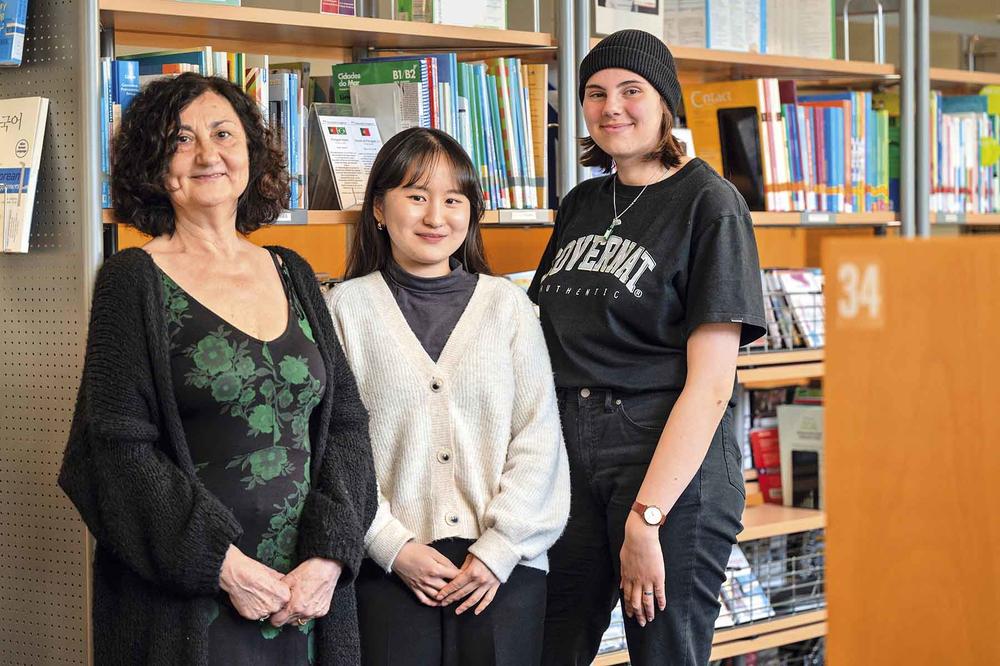"Languages are the key to the world"
The Self-Learning Center of Freie Universität is part of the Language Center - and something very special: It enables employees and students of all disciplines to discover a new language for themselves in very different ways.
May 26, 2023
Philologist Dr. Giovanna Tassinari (left) heads the self-study center; students Jieun Lee (center) and Svenja Wöllecke met there as a language tandem and have since become good friends.
Image Credit: Bernd Wannenmacher
Fleece blankets lie ready over the backs of the red armchairs, the coffee machine gurgles in the corner. The blue carpet muffles the footsteps of students rummaging through the wooden shelves for books, DVDs, exercise sheets or board games. The self-study center is a place to linger, a comfortable meeting place. "It's a real pleasure to see how people find each other here," says Dr. Giovanna Tassinari. The philologist manages the self-learning center, which she helped establish in 2005. The idea: to learn a language independently, using multimedia and at one's own pace, supplemented by consultations and peer workshops by students for students.
"The language learning horizon is much broader than you think," Tassinari says. "There are so many ways to learn, and that goes for languages, too: An app is not the right way for everyone, not everyone feels comfortable in a course." The self-study center offers books and exercise books of a wide variety of languages, international movies and games, learning software and a wide range of learning tips that Tassinari has compiled over the years. She also offers language learning consultations. Student assistants, all of whom are also proficient in several languages, give workshops and feed the Instagram channel (@selbstlernzentrum) with entertaining tips and exercises.
One service that is in high demand is the arrangement of tandem pairs who help each other learn languages. Like Jieun Lee (22) and Svenja Wöllecke (19). The students found each other through the self-study center in October and now say, "We're not just tandem partners, but really good friends." Wöllecke is studying Korean Studies/East Asian Studies in her second semester and wants to improve her Korean; Lee came to Freie Universität in the winter semester as an exchange student. She is studying German and linguistics in South Korea and was looking for a way to learn German even better.
"In the meantime, we have found our own language together," says Wöllecke. "We mix German and Korean, and the other understands exactly what is meant." While some tandem pairs learn primarily at their desks or digitally, the two students have visited a film festival, theaters and markets together, discovered beautiful cafés together - and successfully practiced for a German test Lee needed for a language certificate.
Because Wöllecke spent a year in South Korea as a high school student, the students are familiar with everyday life in each other's country. "For me, that's the best part about our language tandem," Wöllecke points out, "We've lived in both countries, so that connects us, and I feel very understood by Jieun." She adds, "Jieun brings a foreign view of Germany. That helps me reevaluate my own perception." Lee nods, "It's easy for us to talk about political or personal issues without having to explain much around it. We can relate well to how the other is doing through our shared experiences."
For Giovanna Tassinari, the two students are the best example of what languages can make possible: "Languages are the key to the world." Only through languages, she says, is it possible to reach out to one another and break down stereotypes. "When we learn languages, new ways of understanding people in other countries open up."
By Anne Kostrzewa

